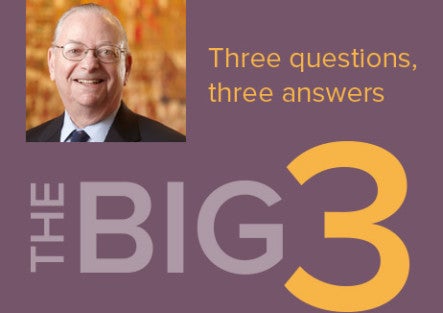June 23, 2014 — Recent disease outbreaks have been traced to deliberately unvaccinated Americans—and anti-vaccine sentiment is a serious health concern. Barry Bloom, an infectious diseases expert at Harvard School of Public Health, thinks health care providers need better strategies—based on solid evidence—for communicating the importance of vaccination to hesitant and skeptical parents.
Why is it so important that research be done on how best to communicate with vaccine-hesitant parents? Can’t health care providers figure out good strategies on their own?
A recent editorial in the journal Science that I co-authored says it best: “Strategies to combat anti-vaccine messages cannot be developed by educated guesswork.” We really need to understand how people get their information about vaccines. Is it from the Internet? Social networks? Religious organizations? Doctors? We also need to understand how people make their decisions. Clearly scientific evidence for many people is not sufficient. And we need to determine the most convincing way for health care providers to present scientific evidence on vaccines so that it addresses parents’ concerns and encourages them to vaccinate their kids and by so doing, protect their communities.
Some interesting recent research looked at four different ways of presenting vaccine information to parents. The one that I would have thought made the most sense, a priori—asking parents if they have concerns about vaccines, asking what the concerns are, acknowledging those concerns, and providing advice but not telling them what to do—did not do best in the study. A second strategy was for the health care provider to say, “I think it’s really important to have your children vaccinated, and here are the reasons. Do you have any questions or concerns?” I would have guessed that would have put people off—but that did the best. The third was to point out how dreadful the diseases were that vaccines have eliminated, but that did poorly. And the fourth was to mention the major source of misinformation about vaccines: a dreadful paper from 15 years ago with made-up data that was later retracted, that said that vaccines cause autism. Not only did that not motivate people to have their children vaccinated, but 5.6% of the parents—who had never heard of the supposed connection between vaccines and autism—decided not to vaccinate their kids after they were told there was no relationship. So this tells us that we don’t know enough about how parents make decisions on vaccination, or how to present information in a way that parents can trust.
Why do you think parents who may be nervous about vaccinations aren’t more worried about their children getting diseases like measles, mumps, or whooping cough?
We have perhaps forgotten—because of the effectiveness of immunization—the ravages of measles or mumps or whooping cough. Today, people think these diseases are really not a problem, because they don’t see them. People don’t know that you can go blind with measles, become sterilized with mumps, or could die from whooping cough. They also think that that they can be protected by “herd immunity”—when vaccination of a substantial part of the population protects those who aren’t immunized. While the good news is that 94% of American kids get their major vaccines, there are communities where that percentage has fallen below what’s required for herd immunity.
In the last year, the U.S. has seen more outbreaks of vaccine-preventable diseases than any year in the past 20 years. The numbers of children affected is now in the hundreds. That could change dramatically. France had about 40 cases of measles in 2007. By 2011, it had shot up to 15,000 cases, with six deaths. Isn’t that astonishing? Measles is among the most communicable infectious diseases. Once you let it get a hold, it takes off.
What about people’s rights to refuse vaccination if they so choose?
Twenty-seven states have exemptions from vaccinations for either religious or personal reasons. The issue of respecting people’s rights is a fundamental issue. But it’s also a major ethical issue, pitting the wishes of individuals against the needs of the community. Do you have a right to create an epidemic in your community? Or to threaten the life of a child who has leukemia that you may not know is in your kid’s class? What do you do if you’re the mother of a child who got AIDS from a blood transfusion, has immunodeficiencies, and is mainstreamed and goes to class? Is it okay for her to worry every day whether her child is going to die? These are serious questions that should be debated, and they’re currently not. Scientists are doing wonderful basic research on developing new vaccines but we urgently need research to learn how to have the current ones used more effectively.
Learn more
Addressing Vaccine Hesitancy (Science)
Public Trust in Vaccines (American Academy of Arts & Sciences)
